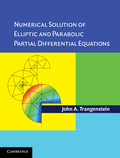Book contents
- Frontmatter
- Contents
- Preface
- 1 Introduction to Partial Differential Equations
- 2 Parabolic Equations
- 3 Iterative Linear Algebra
- 4 Introduction to Finite Element Methods
- 5 Finite Element Theory
- 6 Finite Element Approximations
- 7 Mixed and Hybrid Finite Elements
- 8 Finite Elements for Parabolic Equations
- 9 Finite Elements and Multigrid
- 10 Local Refinement
- Nomenclature
- References
- Author index
- Subject index
6 - Finite Element Approximations
Published online by Cambridge University Press: 05 May 2013
- Frontmatter
- Contents
- Preface
- 1 Introduction to Partial Differential Equations
- 2 Parabolic Equations
- 3 Iterative Linear Algebra
- 4 Introduction to Finite Element Methods
- 5 Finite Element Theory
- 6 Finite Element Approximations
- 7 Mixed and Hybrid Finite Elements
- 8 Finite Elements for Parabolic Equations
- 9 Finite Elements and Multigrid
- 10 Local Refinement
- Nomenclature
- References
- Author index
- Subject index
Summary
Gaps in Our Theory
In Chapter 5 we used some important results from functional analysis to prove some convergence theorems for finite element methods. Careful readers of that chapter will notice at least two very important unresolved issues. First, we did not prove that the approximation assumption in (5.58) is satisfied for any finite dimensional set of functions. To resolve this issue in this chapter, we will discuss the approximation assumption in Section 6.3. Second, in finite element methods, we approximate the weak solution of partial differential equations by mapped shape functions. For unit shapes other than triangles or tetrahedra and for nonlinear coordinate mappings, the mapped shape functions are generally not polynomials, even though the shape functions are polynomials before applying the coordinate maps. We will analyze the error in finite element approximations employing coordinate transformations in Sections 6.4.2 and 6.4.3.
In Chapter 5, our analysis of finite element methods assumed that all integrals are computed exactly. This assumption was in contrast to the discussion in Section 4.10, where we suggested that numerical quadrature should be used to approximate these integrals. We will analyze the errors due to numerical quadrature in Section 6.5. This analysis will allow us to determine how to choose quadrature rules so that the finite element linear systems are non-singular, and so that the error due to quadrature is the same order as the error in the approximation of the solution of the differential equation by piecewise polynomials.
Information
- Type
- Chapter
- Information
- Publisher: Cambridge University PressPrint publication year: 2013
